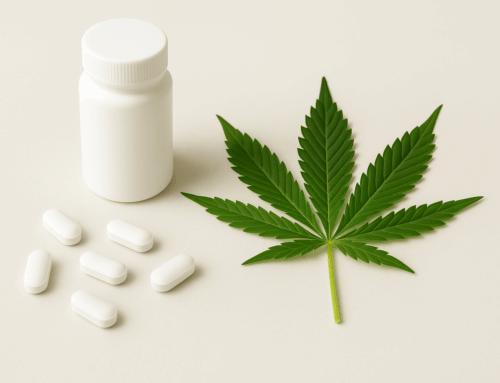What Is Rosin? A Simple Guide to This Cannabis Concentrate
Rosin is a cannabis concentrate made by pressing flowers, hash, or kief using heat and pressure, preserving natural flavors and cannabinoids. This guide will explain what is rosin, how it’s made, its types, and benefits.
Key Takeaways
- Rosin is a cannabis concentrate created through heat and pressure, making it a solventless and cleaner alternative to other concentrates.
- The quality of the starting cannabis material significantly affects the potency and flavor of the final rosin product, with fresh, terpene-rich strains being preferred.
- Proper storage of rosin in airtight containers and cool, dark conditions is crucial for maintaining its quality and preserving its rich flavors and potency.
Understanding Rosin

Rosin is a cannabis concentrate that stands out due to its simplicity and purity. Made by applying heat and pressure to cannabis flower, hash, or kief, rosin avoids the use of any chemical solvents, ensuring a cleaner product. This technique preserves the natural flavors and aromas of the cannabis, retaining the plant’s terpenes and cannabinoids for a high-quality extraction.
Rosin was discovered in 2015 by Phil Salazar, who initially used a hair straightener to press bubble hash. Since then, the technique has evolved significantly. Today, the rosin extraction method has become a staple in the cannabis community, celebrated for its potential to produce high-quality concentrates without the need for solvents.
What Is Rosin?
At its core, rosin is a cannabis concentrate produced by applying heat and pressure to various cannabis materials such as fresh or dried flowers, kief, and hash. This process, known as rosin tech, involves using a rosin press to squeeze the cannabis material between heated plates, extracting a potent, resinous substance. The beauty of rosin lies in its simplicity; it requires no chemical solvents, making it a cleaner option compared to other concentrates.
The materials used in rosin production can vary, but the goal is always the same: to produce a high-quality concentrate that retains the plant’s natural flavors and cannabinoids. Whether using freshly harvested flowers, kief, or hash, the resulting product is a pure, solventless concentrate that offers a rich and flavorful experience.
History of Rosin
Rosin tech, a method for extracting rosin, was discovered in 2015. Phil Salazar, a cannabis enthusiast, stumbled upon the technique while experimenting with bubble hash and a hair straightener. This simple yet effective method quickly gained traction within the cannabis community, leading to the development of specialized rosin presses designed to optimize the extraction process.
Rosin’s popularity has surged since its discovery, especially among those seeking a solventless concentrate. The method has evolved significantly, with advancements in equipment and techniques allowing for higher yields and better quality extractions.
Today, rosin stands as a testament to the ingenuity of cannabis enthusiasts and their quest for pure, flavorful cannabis concentrates.
The Rosin Extraction Process

Extracting rosin is straightforward and fascinating, relying solely on heat and mechanical pressure instead of solvents. This means that the final product is free from any residual solvents, making it a healthier option for consumers.
The process starts with selecting and preparing the cannabis material, followed by pressing it using a rosin press. The resulting product is collected and stored properly to maintain its quality. Each step in this drying and curing process plays a crucial role in ensuring the potency and flavor of the final rosin concentrate.
Harvesting and Preparing Cannabis Material
The journey to creating high-quality rosin starts with the cannabis plant itself. Strains rich in terpenes and trichomes significantly influence the flavor and potency of the final product. Cannabis should be harvested at its peak maturity and quickly frozen to preserve its quality. This flash frozen cannabis plants process helps maintain the plant’s fragile terpenes and cannabinoids, which are essential for a flavorful and potent concentrate.
Once harvested, the cannabis material must be properly prepared for extraction. This involves trimming and curing the buds to ensure they are in optimal condition for pressing. The quality of the starting material is paramount, as it directly impacts the effectiveness and flavor of the resulting rosin.
Using a Rosin Press
The rosin press is central to the extraction process. This device uses a combination of heat and pressure to extract the resin from the cannabis material. Temperatures typically range between 160°F and 220°F, with the exact temperature depending on the type of material being pressed. The goal is to apply enough heat to extract the oil without degrading the terpenes and cannabinoids.
Pressing cannabis involves placing the material between heated plates and applying controlled pressure. This process can be performed using professional rosin presses or even household items like hair straighteners. Hot rosin typically has a drippy light yellow or golden oil consistency, which cools into a more stable form.
Collecting and Storing Rosin
After extraction, proper collection and storage are essential to maintain rosin’s quality. Pressing typically ranges from a few seconds to 30 seconds, depending on the material and desired consistency. After pressing, the rosin is scraped off the parchment paper and allowed to cool, taking on a creamier consistency similar to honey.
Storing rosin correctly preserves its potency and flavor. It’s best to store rosin in airtight containers, away from light and heat, to prevent degradation. Specialized storage bags can also be used to maintain the terpenes and cannabinoids, ensuring a high-quality concentrate for weeks or even months.
Types of Rosin

Rosin is a versatile concentrate that can be categorized into different types based on the source material and extraction method employed. The starting material plays a significant role in determining the characteristics and quality of the final product.
Rosin can be categorized into three main types: flower rosin, hash rosin, and kief rosin. Each type offers unique benefits and appeals to different preferences.
Flower Rosin
Flower rosin is made from freshly harvested cannabis flowers, offering a complex terpene profile and potent effects. Flower rosin is highly valued for capturing the natural flavors and aromas of the cannabis plant, providing a rich experience. The process involves pressing freshly cut buds, which helps preserve a robust terpene profile.
Cannabis connoisseurs prefer flower rosin for its full-spectrum benefits and intense flavor. Using freshly harvested cannabis plants ensures that the delicate terpenes and cannabinoids are retained, resulting in a highly potent and flavorful concentrate made from cured cannabis flower.
Hash Rosin
Hash rosin is created from hash or bubble hash, known for its high concentrations of both cannabinoids and terpenes. This type of rosin is particularly potent, making it a favorite among those seeking a strong and effective concentrate. Pressing hash or bubble hash extracts resin, resulting in a product with higher cannabinoid content than traditional extracts.
Hash rosin’s rich terpene profile and high potency appeal to many cannabis enthusiasts. It offers a robust flavor and powerful effects, often surpassing other types of rosin in terms of strength and aroma.
Kief Rosin
Kief rosin is extracted from kief, the resinous trichomes that fall off cannabis flowers. This type of rosin is known for its unique texture and rich flavor profile. Pressing kief extracts resin, resulting in a concentrate with distinctive consistency and potent effects.
Kief rosin is highly sought after for its flavorful profile and the unique experience it offers. Cannabis enthusiasts appreciate the distinct texture and potent effects, making it a popular choice among those looking for a high-quality concentrate.
Benefits of Rosin

Rosin’s popularity in the cannabis community stems from several compelling reasons. Its extraction method retains natural terpenes and cannabinoids, offering a rich and flavorful experience. Additionally, rosin is a solventless concentrate, meaning it does not involve any chemical solvents in its production, ensuring a pure and safe product for consumers.
Rosin provides a full-spectrum extract, capturing the entire range of cannabinoids and terpenes from the starting material. This enhances the therapeutic effects and overall experience for users. Rosin is also known for its high potency and robust flavor, making it a favorite among cannabis enthusiasts.
Solventless Concentrate
Rosin’s solventless nature is one of its most appealing features. Produced using only heat and pressure, rosin ensures a cleaner and purer product by avoiding chemical solvents. This method eliminates the risk of residual solvents, which can be harmful to health, making rosin a safer choice for consumers.
Many enthusiasts prefer rosin for its natural extraction process. Unlike solvent-based concentrates, rosin retains the plant’s natural integrity, providing a more authentic experience. Rosin is free from residual chemicals, ensuring a high-quality concentrate.
Full Spectrum Extract
Rosin captures the full spectrum of cannabinoids and terpenes from the cannabis plant. This comprehensive extraction ensures that all the active compounds are preserved, enhancing the therapeutic effects and overall experience for users. Live rosin, in particular, is known for high cannabinoid concentrations, delivering potent effects and vibrant flavors.
The starting material’s quality greatly impacts the final product’s terpene profile and potency. Using freshly harvested plants allows rosin to retain delicate terpenes and cannabinoids, providing a rich concentrate. This approach makes rosin a preferred choice for a holistic cannabis experience.
High Potency and Flavor
Rosin stands out for its high potency and rich flavor profile. The extraction process preserves delicate terpenes and cannabinoids, resulting in a robust and aromatic concentrate. Many cannabis enthusiasts prefer rosin for its intense flavor and potent effects, making it a top choice for those seeking a powerful and enjoyable experience.
Live rosin production, though labor-intensive and time-consuming, results in a higher-quality product. The rich terpene profile and high potency make rosin a favorite among those looking for a premium cannabis concentrate.
How to Consume Rosin

Rosin is a versatile concentrate that can be consumed in various ways, each providing a unique experience. Whether dabbing, vaping, or adding to joints and bowls, rosin offers a rich and flavorful cannabis experience.
Your chosen method will depend on personal preferences and available equipment.
Dabbing Rosin
Dabbing is a popular way to consume rosin. This is when you heat a small amount of rosin on a hot or warm surface, typically a dab rig, and inhaling the vapor. Live rosin, with its robust flavor and low melting point, is especially suited for dabbing. Gently applying the flame helps avoid scorching the delicate terpenes.
Dabbing offers a potent experience that many enthusiasts enjoy. Its immediate effects and intense flavor make it a preferred method for a powerful hit.
Vaping Rosin
Vaping rosin offers another convenient and effective consumption method. Portable vaporizers or vape pens with a live resin cartridge allow you to enjoy rosin on the go. These devices often feature adjustable temperature controls to optimize the experience.
To vape rosin, place a small amount in the vaporizer’s heating chamber and adjust the temperature for a smooth hit. This method is popular for its ease of use and ability to control session intensity.
Adding Rosin to Joints and Bowls
Adding rosin to joints and bowls enhances the flavor and potency of your cannabis. Mix rosin with cannabis buds inside a joint or bowl, or coat the outside for extra flavor.
Using live rosin this way accentuates flavor and elevates the smoking experience, providing a potent hit. This method is simple and effective, making it accessible for all levels of cannabis consumers.
Proper Storage for Rosin
Storing rosin properly is crucial to maintaining its quality. Light, heat, and air exposure can degrade cannabinoids and terpenes, affecting potency and flavor.
Proper storage extends rosin’s shelf life, ensuring high quality for weeks or months.
Airtight Containers
Airtight containers, such as mason jars, minimize oxidation and preserve rosin’s integrity. Glass containers are preferred over silicone to avoid reactions with terpenes, ensuring a pure product. For long-term storage, freezing rosin in a glass jar helps maintain its terpene profile and potency.
Store rosin in a dark environment to prevent degradation from light exposure. Keeping rosin in a freezer rather than a refrigerator protects it from temperature fluctuations and humidity.
Cool, Dark, Dry Places
Store rosin in a cool, dry, and dark place for optimal preservation. Such an environment maintains the concentrate’s quality by limiting exposure to degrading elements. Using a slightly larger glass jar than the concentrate minimizes air exposure, further protecting rosin.
Following these storage tips allows you to savor rosin’s rich flavors and potent effects for an extended period.
Comparing Rosin to Other Concentrates
Rosin stands out for its purity, flavor, and solventless extraction process. Comparing rosin to live resin, distillate, and shatter highlights its unique benefits and appeal.
Each concentrate offers different experiences, so understanding their differences is essential.
Rosin vs. Live Resin
Live resin is another popular concentrate, known for its intense flavor and aroma. The live resin extraction method typically involves solvents like butane, whereas rosin uses a solventless method with heat and pressure. This difference in methods results in live resin having a more potent effect and distinct flavor compared to rosin.
Both have high cannabinoid content, but preferences and lifestyle choices influence the decision between them. Rosin’s solventless nature appeals to those seeking a purer product, while both live resin is favored for its powerful effects and rich flavor.
Rosin vs. Distillate
Distillate is a highly refined concentrate, known for its versatility and high potency. Unlike rosin, a solventless concentrate, distillate is produced using solvents and then refined to remove impurities. While distillate offers a pure product, it often lacks the full spectrum of cannabinoids and terpenes that rosin retains.
Rosin is celebrated for its natural extraction process and full-spectrum benefits, making it a preferred choice for those seeking a more holistic cannabis experience. On the other hand, distillate’s versatility in consumption methods, such as edibles and vape cartridges, appeals to those looking for a potent and adaptable concentrate.
Rosin vs. Shatter
Shatter is a type of cannabis concentrate known for its glass-like consistency and high potency. The production of shatter involves a solvent-based extraction method, which can result in a higher yield but may retain residual solvents.
In contrast, rosin is produced by applying heat and pressure, avoiding the use of chemical solvents altogether. Users often report that rosin has a fuller flavor profile and a smoother experience compared to shatter, which can be harsher due to the solvents used in its production.
The solventless nature of rosin ensures a cleaner product, making it a healthier option for consumers seeking a pure and flavorful concentrate.
Summary
Rosin has emerged as a standout cannabis concentrate, celebrated for its purity, flavor, and solventless extraction process. By applying heat and pressure to cannabis materials such as flowers, kief, and hash, rosin captures the plant’s natural terpenes and cannabinoids, offering a rich and potent experience. The various types of rosin, including flower rosin, hash rosin, and kief rosin, each provide unique benefits and appeal to different preferences.
Whether you prefer dabbing, vaping, or adding rosin to joints and bowls, this versatile concentrate offers a range of consumption methods to suit your needs. Proper storage is essential to maintain the quality of rosin, ensuring that you can enjoy its full spectrum benefits, high potency, and rich flavor for an extended period. As the cannabis community continues to embrace rosin, its popularity is set to grow, offering a cleaner, more natural option for cannabis enthusiasts everywhere.
Frequently Asked Questions
What is rosin?
Rosin is a cannabis concentrate created through the application of heat and pressure to cannabis materials, including flowers, kief, and hash, without the use of chemical solvents. This method ensures a pure and potent extract.
How is rosin different from live resin?
Rosin is created through a solventless extraction process utilizing heat and pressure, whereas live resin employs solvents like butane. Consequently, live resin generally offers a more potent effect and richer flavor than rosin.
What are the benefits of using rosin?
Using rosin ensures a solventless concentrate that provides a full spectrum extract, maintaining high potency and rich flavor. This makes it an excellent choice for those seeking a pure and flavorful experience.
How should I store rosin?
To preserve its quality, store rosin in airtight glass jars in a cool, dark, and dry environment. Freezing it can further maintain its terpene profile and potency.
What are the different types of rosin?
The different types of rosin include flower rosin, hash rosin, and kief rosin, each derived from various starting materials that contribute to their distinct properties and benefits. Understanding these types can enhance your experience and selection in product use.






Leave A Comment
You must be logged in to post a comment.